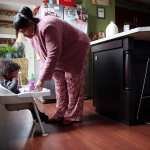After navigating uncertainty and stress as a child care worker during the pandemic, Yesenia Vargas finally can see a bright spot.
Vargas, who works with 2-year-olds and 3-and-a-half-year-olds, has received $14,000 as part of Washington, D.C.,’s Pay Equity Fund for early childhood educators. The money aims to support child care workers and early childhood educators, who are predominantly underpaid women. And within this low-paid field, many are women of color who face greater economic barriers and are less likely to earn a living wage.
Vargas has worked at Petite Scholars, a network of child care centers in the city, for about five years, and has been working with children for over 10 years. She said over text that the money has helped her and another colleague start to pay off personal debt, particularly for education and housing. Low-income families who were left without jobs or who worked few hours during the pandemic, or whose partners were unable to work, especially need the assistance, she said.
For all the emotional rewards that come with the work — Vargas said she gets satisfaction from teaching children at a crucial part of their lives — many child care workers are financially struggling and often feel left behind by a society that doesn’t value their work. When she and her colleagues first heard about the grant money last year, they were initially suspicious and unsure if the funds were real, she told The 19th through a translator in March. But now the money has taken some stress off their shoulders and motivated them to keep going, she said.
“I know that we are giving our best, and in a few years, Washington, D.C., will have the most prepared teachers for early education centers,” she told The 19th in Spanish. Out of the ten employees at her center who have applied for the funds, only she and one other colleague have received money so far. She hopes the others will get paid within the next few weeks.
“The truth is the process is slow,” she said over text.
-
More from The 19th
- New York poised to increase child care budget by billions, which could help women reenter the workforce
- Magnolia Mother’s Trust marks a history-making three cycles of paying Black mothers $1,000 a month
- A historic child care investment saved centers from collapse. What happens when the money runs out?
Vargas sent her application on August 15 and received her payment about a month later via direct deposit. When she saw the amount, she felt relief — and felt that her work, and her night classes at the University of the District of Columbia going towards an associate’s degree in child development, have been worth it. The money can be used for housing, food and other personal expenses, Vargas said.
As of last Tuesday, 2,600 of 3,700 total applications for the grant program had been approved, Axios reported at the time. Applications for the funds are due no later than 5 p.m. on September 20. Applicants need to present a government-issued ID, headshot or selfie, Social Security number, W-9 form, and child development facility license number.
Full-time teachers are eligible for $14,000 payments, and full-time assistant teachers or associate caregivers can get $10,000. Part-time teachers are eligible for $7,000, alongside part-time assistant teachers that can receive $5,000. The direct payments are part of a larger plan to increase salaries for child care workers in the city. In 2023, child care workers will receive smaller quarterly payments, and in 2024, the program will instead send funds to child development facilities that agree to pay their staff at a new, higher compensation scale.
Paris Pegues, a teacher’s assistant who works with pre-K students at AppleTree in D.C., wasn’t sure if she was eligible for the grant money. The program excludes lead teachers in pre-K enhancement and expansion programs (PKEEP), since child development facilities that are part of PKEEP are supposed to pay teachers at parity with D.C. public school teachers.
Pegues still applied for the grant on Tuesday. She had told The 19th in March that the money would help her jumpstart her savings, get a car, or be put towards her rent or taking care of her family. It could also offset some of the personal costs she has taken on for work. As a lead teacher at Kiddie’s Kollege earlier this year, she often paid almost $75 a week on Lyfts to get to work — and at one point early in the job, paid almost $200 a week for a babysitter.
Teachers deserve more resources and more acknowledgement for the work that they take on, she said. “We’re literally teaching the future,” she said. “A lot of children, especially in the southeast [part of the city], don’t go home to love. Don’t go home to food. Don’t go home to friends, family, anything. So when they come to school, this is like their second home. We’re co-parenting with their real parents,” she said.
Ruqiyyah Anbar-Shaheen, director of early childhood at non-profit DC Action, has led advocacy for higher child care pay in D.C. for years and joined the task force appointed to make recommendations on the fund’s use. Staff and teachers in early childhood education have been primarily women for a long time, she told The 19th in February — and that contributes to the work being undervalued.
“Caretaking has often been treated as unpaid work or low-paid work,” she said. Those in the industry don’t want to be seen as glorified babysitters and want to be recognized for the complexity and demands of their work.
“This has been an industry that’s been struggling for a long time, but it’s continued on the backs of Black and Brown women who are the teachers in our early learning system,” Anbar-Shaheen said on Tuesday. It’s crucial that as the District continues to disperse the funds, they ask teachers how the program is and isn’t working for them, she said.







